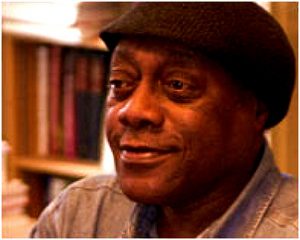
James Alan McPherson was an American essayist and short-story writer. He was the first African-American writer to win the Pulitzer Prize for Fiction, and was included among the first group of artists who received a MacArthur Fellowship. At the time of his death, McPherson was a professor emeritus of fiction at the Iowa Writers' Workshop.
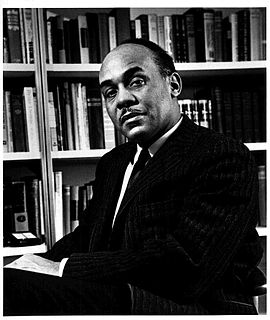
Ralph Waldo Ellison was an American novelist, literary critic, and scholar best known for his novel Invisible Man, which won the National Book Award in 1953. He also wrote Shadow and Act (1964), a collection of political, social and critical essays, and Going to the Territory (1986). For The New York Times, the best of these essays in addition to the novel put him "among the gods of America's literary Parnassus." A posthumous novel, Juneteenth, was published after being assembled from voluminous notes he left upon his death.
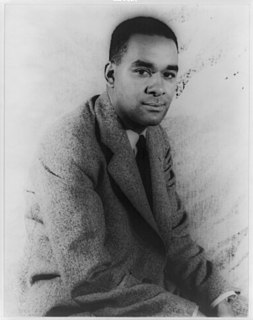
Richard Nathaniel Wright was an American author of novels, short stories, poems, and non-fiction. Much of his literature concerns racial themes, especially related to the plight of African Americans during the late 19th to mid-20th centuries, who suffered discrimination and violence in the South and the North. Literary critics believe his work helped change race relations in the United States in the mid-20th century.

James Arthur Baldwin was an American novelist, playwright, essayist, poet, and activist. His essays, as collected in Notes of a Native Son (1955), explore intricacies of racial, sexual, and class distinctions in Western society, most notably in regard to the mid-twentieth-century United States. Some of Baldwin's essays are book-length, including The Fire Next Time (1963), No Name in the Street (1972), and The Devil Finds Work (1976). An unfinished manuscript, Remember This House, was expanded and adapted for cinema as the Academy Award–nominated documentary film I Am Not Your Negro (2016). One of his novels, If Beale Street Could Talk, was adapted into an Academy-Award-winning dramatic film of the same name in 2018, directed and produced by Barry Jenkins.

Invisible Man is a novel by Ralph Ellison, published by Random House in 1952. It addresses many of the social and intellectual issues faced by the African Americans in the early twentieth century, including black nationalism, the relationship between black identity and Marxism, and the reformist racial policies of Booker T. Washington, as well as issues of individuality and personal identity.

Charles Richard Johnson is a scholar and the author of novels, short stories, screen-and-teleplays, and essays, most often with a philosophical orientation. Johnson has directly addressed the issues of black life in America in novels such as Dreamer and Middle Passage. Johnson was born in 1948 in Evanston, Illinois, and spent most of his career at the University of Washington in Seattle.

African-American literature is the body of literature produced in the United States by writers of African descent. It begins with the works of such late 18th-century writers as Phillis Wheatley. Before the high point of slave narratives, African-American literature was dominated by autobiographical spiritual narratives. The genre known as slave narratives in the 19th century were accounts by people who had generally escaped from slavery, about their journeys to freedom and ways they claimed their lives. The Harlem Renaissance of the 1920s was a great period of flowering in literature and the arts, influenced both by writers who came North in the Great Migration and those who were immigrants from Jamaica and other Caribbean islands. African-American writers have been recognized by the highest awards, including the Nobel Prize given to Toni Morrison in 1993. Among the themes and issues explored in this literature are the role of African Americans within the larger American society, African-American culture, racism, slavery, and social equality. African-American writing has tended to incorporate oral forms, such as spirituals, sermons, gospel music, blues, or rap.
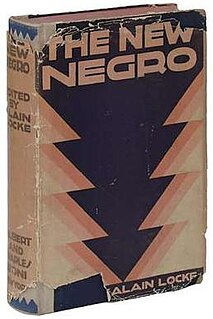
The New Negro: An Interpretation (1925) is an anthology of fiction, poetry, and essays on African and African-American art and literature edited by Alain Locke, who lived in Washington, DC, and taught at Howard University during the Harlem Renaissance. As a collection of the creative efforts coming out of the burgeoning New Negro Movement or Harlem Renaissance, the book is considered by literary scholars and critics to be the definitive text of the movement. "The Negro Renaissance" included Locke's title essay "The New Negro," as well as nonfiction essays, poetry, and fiction by writers including Countee Cullen, Langston Hughes, Zora Neale Hurston, Claude McKay, Jean Toomer, and Eric Walrond.
Richard Warrington Baldwin Lewis was an American literary scholar and critic. He gained a wider reputation when he won a 1976 Pulitzer Prize for Biography or Autobiography, the first National Book Critics Circle Award for nonfiction, and a Bancroft Prize for his biography of Edith Wharton. The New York Times called the book "a beautifully wrought, rounded portrait of the whole woman, including the part of her that remained in shade during her life" and said that the "expansive, elegant biography ... can stand as literature, if nothing else."

Lewis Nkosi was a South African writer, who spent 30 years in exile as a consequence of restrictions placed on him and his writing by the Suppression of Communism Act and the Publications and Entertainment Act passed in the 1950s and 1960s. A multifaceted personality, he attempted every literary genre, literary criticism, poetry, drama, novels, short stories, essays, as well as journalism.
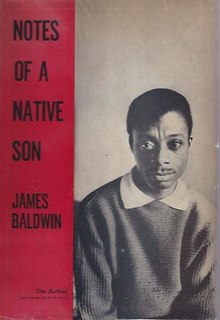
Notes of a Native Son is a collection of ten essays by James Baldwin, published in 1955, mostly tackling issues of race in America and Europe. The volume, as his first non-fiction book, compiles essays of Baldwin that had previously appeared in such magazines as Harper's Magazine, Partisan Review, and The New Leader.
John F. Callahan is literary executor for Ralph Ellison, and was the editor for his posthumously-released novel Juneteenth. In addition to his work with Ellison, Callahan has written or edited numerous volumes related to African-American literature, with a particular emphasis on 20th century literature.

Mat Johnson is an American fiction writer who works in both prose and the comics format. In 2007, he was named the first USA James Baldwin Fellow by United States Artists.
The Anisfield-Wolf Book Award is an American literary award dedicated to honoring written works that make important contributions to the understanding of racism and the appreciation of the rich diversity of human culture. Established in 1935 by Cleveland poet and philanthropist Edith Anisfield Wolf and originally administered by the Saturday Review, the awards have been administered by the Cleveland Foundation since 1963.

Three Days Before the Shooting... is the title of the edited manuscript of Ralph Ellison's never-finished second novel. It was co-edited by John F. Callahan, the executor of Ellison's literary estate, and Adam Bradley, a professor of English at the University of Colorado at Boulder. The book was published on January 26, 2010, by Modern Library. An excerpt of Ralph Ellison's unfinished manuscripts was previously published as Juneteenth (1999).
Edward Margolies was an American literary critic and biographer.
Robert Adamson Bone was a scholar of African-American literature and a professor of English at Columbia University.
A novelist is an author or writer of novels, though often novelists also write in other genres of both fiction and non-fiction. Some novelists are professional novelists, thus make a living writing novels and other fiction, while others aspire to support themselves in this way or write as an avocation. Most novelists struggle to get their debut novel published, but once published they often continue to be published, although very few become literary celebrities, thus gaining prestige or a considerable income from their work.
Adam Bradley is an American literary critic, professor, and a writer on popular culture. He is the author or editor of six books. Bradley has written extensively on song lyrics as well as on the literature and legacy of the American novelist Ralph Ellison. His commentary has appeared in The New York Times, The Wall Street Journal, The Washington Post and in numerous other publications. He is a professor of English at the University of Colorado, Boulder where he directs the Laboratory for Race & Popular Culture.

Barbara Foley, Distinguished Professor of English at Rutgers University-Newark, focuses her research and teaching on U.S. literary radicalism, African American literature, and Marxist criticism. The author of six books and over seventy scholarly articles, review essays, and book chapters, she has published on literary theory, academic politics, US proletarian literature, the Harlem Renaissance, and the writers Ralph Ellison and Jean Toomer. Throughout her career, her work has emphasized the centrality of antiracism and Marxist class analysis to both literary study and social movements.













